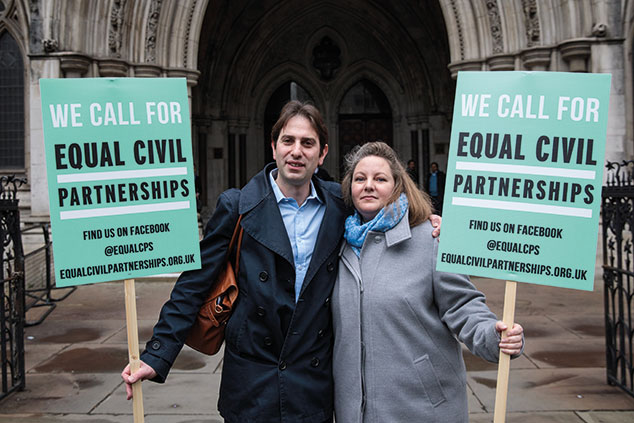
Government plans to introduce civil partnerships for heterosexual couples should give unmarried men and women access to valuable new pension benefits and tax savings.
The prime minister confirmed last week that the government would consult on how to ensure heterosexual couples can enter into civil partnerships, which have been available to gay couples since 2005. The move follows a Supreme Court victory earlier this year by heterosexual couple Charles Keidan and Rebecca Steinfeld, who are in a long-term relationship. They argued they should be allowed to enter into a civil partnership, as well as being able to get married, since both options are available to same-sex couples.
Valuable financial benefits
A change in the law would enable more than three million co-habiting couples in the UK to formalise their relationships without getting married, gaining important financial protections available only to married couples or civil partners. While many couples believe they already have these, there is in fact no recognition of “common-law partners” in
UK law, which leaves many couples vulnerable. When it comes to pensions, the most serious issue is certain pension schemes only offer survivors’ benefits to members’ spouses or civil partners. An increasing number of pension schemes now automatically recognise unmarried partners, but they have varying definitions of what constitutes a couple.
State-pension entitlements may also be a problem for some couples, with unmarried partners unable to make any claim on the basis of the national insurance contributions made by one another. Couples splitting up also face difficulties, with neither partner having any right to claim a share of their ex’s pension savings. Co-habiting partners miss out elsewhere too. Married couples and civil partners are free to pass assets to one another without any fear of tax consequences – and can even share their income-tax allowances in certain circumstances. Finally, inheritance tax (IHT) is also an issue. All assets left by one spouse or civil partner to the other are exempt from IHT – the first to die can pass on their IHT allowance, doubling the amount the couple can jointly leave to heirs. Unmarried couples don’t get these perks.
The advantages available to married couples are so valuable that a typical couple married for 50 years could end up £190,000 better off than a couple who never tie the knot, estimates funds supermarket Hargreaves Lansdown.